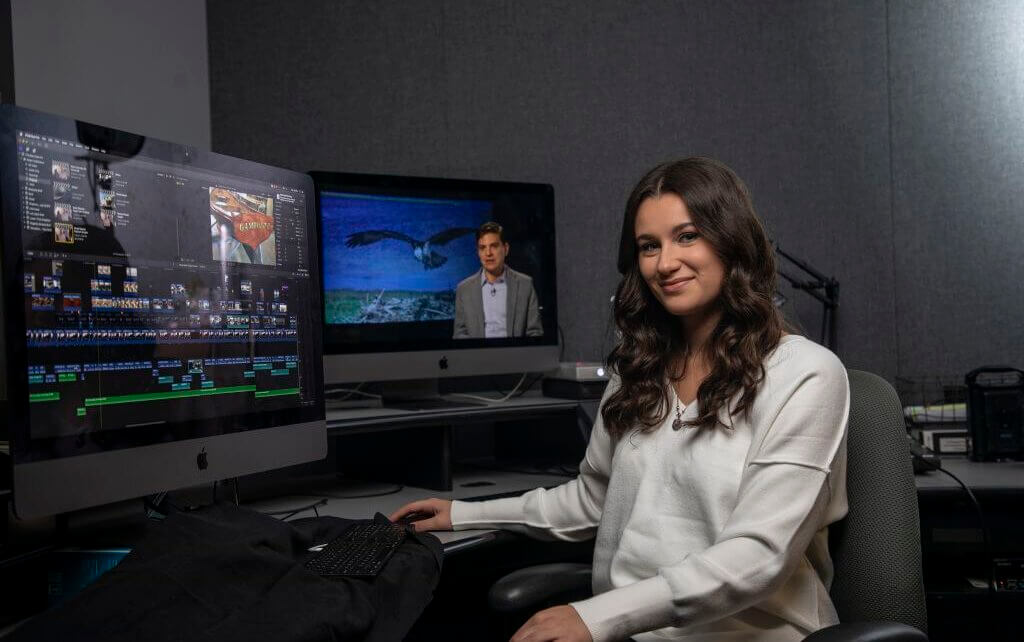Monmouth University Production Services collaborated with Save Barnegat Bay (SBB), a local environmental nonprofit organization, to produce Drift, a feature-length documentary that tells the story of Barnegat Bay and its natural, recreational, and economic roles in the watershed community.
“The objective of Production Services is to work with nonprofits to build community engagement and allow the students to have experiential learning,” said Erin Fleming, Director of Production Services. The crew involved in the production of Drift consisted of Monmouth University students and faculty working alongside industry professionals.
“This department takes it up a notch and adds to the skills that are learned in the classroom,” she added. “You have to have a certain skill set. Skills can be taught, but what you can’t teach is that drive. It’s a different kind of person that goes into production.”
The film, which Fleming noted was one of the biggest projects ever taken on by Production Services, celebrates SBB’s 50th year of preserving the bay by taking viewers through “50 years of complex issues through a series of short vignettes, using a variety of perspectives, viewpoints, and experiences,” according to SBB’s website.
The 90-minute documentary is divided into five segments, tackling subjects including the deterioration of the Toms River subwatershed, overdevelopment on the bay, early conservation efforts, and much more.
Fleming described the process of sitting down with Save Barnegat Bay to come up with a concept for the film. “We didn’t want to just tell the history of Save Barnegat Bay. That tends to turn some audiences off,” she explained. “What we came up with is the idea that Barnegat Bay is a multicultural setting. Everything that happens on the entire watershed is connected to the bay.”
Eventually, they agreed to make the premise of the film five different stories relating to the bay. “Each story sort of speaks to a different group so that nobody is pointing fingers, but it’s sort of saying ‘Look, we all love this national treasure and we should be respecting it,’” said Fleming.
Fleming described Britta Forsberg, Executive Director of Save Barnegat Bay, as “a force” and “a very intelligent woman.”
“She understands that you’re bringing experts into the room and to let them go their own way,” explained Fleming. “She just tempered that direction as she needed to and allowed us to pitch ideas. She was really helpful in helping us decide what stories were the most relevant.”
After deciding what direction to go with the film, the first year was dedicated to pre-production. This involved deciding who to interview, how the story was going to develop, gathering archival materials, and conducting research.
The second year was spent putting all of these materials together, editing, and deciding what graphics, statistics, and animations were going to be added.
“It was rewarding for the students involved and rewarding for the communication department and my department as a whole,” said Fleming. “It was an incredible two years. A lot of hard work, but we are so proud of what we’ve achieved.”
Nicole Amatucci, a communication student who graduated in 2021, was involved in pre-production, production, and post-production for Drift as an Associate Producer, Editor, and Camera Operator.
“This experience was completely different from a classroom,” described Amatucci. “We were creating a product for a real client, so that comes with a lot more responsibility and pressure than getting a good grade. This will always be a project that I’ll have been proud to work on because it taught me responsibility, discipline, and technical skills that I have brought with me into the working world. It gave me an excellent base of technical and creative skills that I’ve been able to work on since I graduated.”
Jared Garcia, another communication alumnus from the class of 2021, was also involved in the production of Drift as a Camera Operator and Co-Editor.
“Production Services gives students a lot of hands-on, experiential learning,” explained Garcia, who noted that he learned about editing, interviews, and shooting film from his time on the Drift set.
A screening of Drift is available for the Monmouth University community on Friday, April 22 at 6 p.m. At 7:30 p.m., Fleming will moderate a discussion panel about some of the issues covered in the film. Panelists include Jason Adolf, Ph.D., Endowed Associate Professor of Marine Science, Catherine Duckett, Ph.D., Associate Dean of the School of Science, Tom Herrington, Ph.D., Associate Director of the Urban Coast Institute, Graceanne Taylor, Education and Outreach Coordinator for Save Barnegat Bay, and John Tiedemann, Assistant Dean of the School of Science and Director of the Marine and Environmental Biology and Policy Program.
“The most useful actions will be collective, but some of them start at home,” she continued, noting the importance of taking action to protect Barnegat Bay from some of the dangers showcased in the film. “There are all kinds of things we can do for the watershed, but the biggest things are to advocate for town ordinances, reduce impermeable surfaces, and advocate for storm water utility in your town.”
“The main issue with Barnegat Bay is eutrophication,” added Adolf. “We need to keep our waste and our excess fertilizer, or anything else with nitrogen in it, out of the Bay.”
Adolf suggested that taking care of old septic systems, fixing leaking sewer systems, and prioritizing oyster restoration could all benefit the health of Barnegat Bay.
“We need everybody in the conversation, and I think that part of the film was good in emphasizing preservation and conservation,” added Duckett. “We’re not going to save the world without everybody participating, we’re just not.”
“The conversation is going to be fascinating and valuable,” Duckett concluded.




